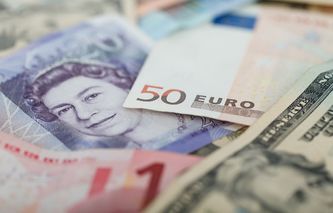Having the right type of bank account can make all the difference when it comes to planning and enjoying your travels. The last thing you want is for your holidays to be spoiled by unexpected costs or lack of access to banking features.
Starling and Monzo rank among the best bank accounts for travellers thanks to their low fees and competitive exchange rates.
Whether you're looking for cashback on accommodation or free ATM withdrawals abroad, this guide will review and compare all the best options.
Best Bank Accounts for Travellers – Our Top Picks
| Name | Score | Visit | Disclaimer | |
|---|---|---|---|---|
 | 8.5 | Visitstarlingbank.com | ||
 | 9.2 | Visitwise.com | ||
 | 8.5 | Visitrevolut.com | ||
 | 8.4 | Visitmonzo.com | ||
 | 7.4 | Visitmonese.com | ||
 | 7.0 | Visitpayoneer.com |
The Best Bank Accounts for Travelling Reviewed
Let's take a closer look at the features of each bank account we've shortlisted.
Best Bank Accounts for Tavelling at a glance
Here is a quick recap of the best bank accounts for travelling:
Best for overseas ATM withdrawals – Starling
Best for low ATM fees – Monzo
Best for multi-currency transfers – Revolut
Best for multi-currency accounts – Wise
Best for travelling to Europe – Monese
Best for freelancers – Payoneer
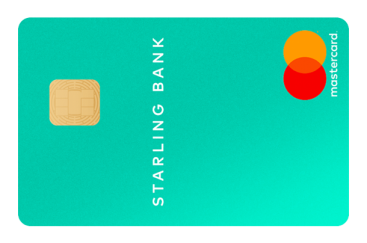
Starling Bank is renowned for its affordable and competitive rates, making it an ideal choice for domestic and international transactions (it even made it onto our list of the best online banks in the UK). Notably, customers who make foreign transactions or ATM withdrawals abroad are not charged any fees. This contrasts sharply against many competitors, such as Revolut, which charges a 2% fee on card transactions above a set limit.
Starling is a digital-only bank based in the UK that caters to residents aged 16 years or older. In addition to personal accounts, the bank now also offers business and joint bank accounts that can be managed through its modern and user-friendly app.
Its UK banking licence ensures that deposits of up to £85,000 are protected under the Financial Services Compensation Scheme. What's more, Starling pays interest of 3.25% AER on balances of up to £5,000. Alternatively, if you want to save up for a big holiday, you can put anything from £2,000 to £1 million in a 1-year fixed saver for a return of 5.36%.
Pros
- Fee-free ATM withdrawals and payments abroad
- Mastercard’s exchange rates for transactions in foreign currencies
- Earn interest of 3.25% AER
Cons
- Interest payments are capped at deposits of £5,000 or less
- £10 fee for sending a replacement card abroad (if possible)
- Variable overdraft interest rates (15%, 25%, or 35% AER)
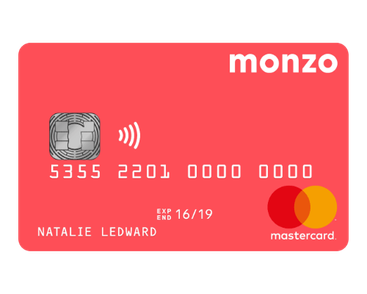
Monzo is a highly sought-after option for those in search of a travel card that offers reasonable ATM fees and capped overdraft charges. With Monzo, you have the convenience of being able to spend your money anywhere and in any currency, at Mastercard’s exchange rates.
One of the most significant features of Monzo is its categorised spending system, where you can track your expenses by type of transaction. With this system, you can analyse your spending patterns, identify areas where you spend the most, and adjust your budget accordingly.
Monzo also provides the option of smart savings, where it rounds up the amounts you spend and stores the difference as savings. You can choose to keep these savings separately for better management and overview, and even earn interest on them as you save up for that special holiday.
With your Monzo card, outside the EEA, you can withdraw £200 free of charge every 30 days, after which you’ll be charged 3% per ATM withdrawal. If you have a Monzo Plus subscription, this limit rises to £400 and up to £600 with Monzo Premium. Within the EEA, you can make unlimited fee-free withdrawals as long as Monzo is your main bank account.
The Shared Tab feature makes it easy to settle up when you want to split holiday costs with others. What's more, Monzo Premium comes with added benefits for travellers, such as travel insurance, phone insurance, and discounted access to airport lounges.
Pros
- Fee-free payments abroad
- Arranged and unarranged overdrafts
- Instant Access Saving Pots to help you save for your travels at a 4.1% AER interest
Cons
- £1 fee for PayPoint cash deposits
- Receiving international money transfers isn't reliable
- There are varying ATM withdrawal limits abroad
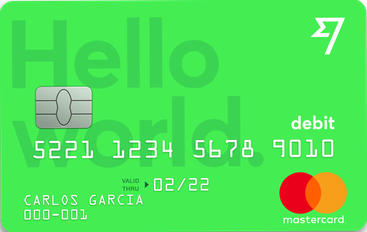
Wise is revolutionising the way we send money internationally and by creating its own payment network, the bank has eliminated inefficiencies and high costs usually associated with sending global payments. There are no hidden fees, bundled services, or exchange rate markups, as the charges are shown upfront.
Wise offers its services to over 70 countries, and their fees remain consistently low and transparent, regardless of where you're sending money. When sending large sums of money, Wise offers discounted rates, with fees being lower if you send over £100,000 (or the equivalent in US dollars) in one transaction or multiple transactions in a month.
Additionally, the Wise Asset program provides a unique opportunity for investment enthusiasts. You can invest money directly from your Wise account in the iShares World Equity Index Fund, whose holdings include stocks in top-performing companies such as Apple, Microsoft, and Tesla.
Pros
- Access to instant money transfers
- Low transfer fees with no markup on exchange rates
- Earn interest daily
Cons
- No physical bank branches, making cash deposits difficult
- The card costs £7
- Fees vary based on location, making them difficult to understand
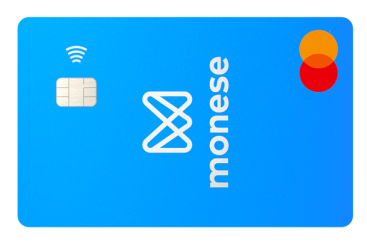
If you reside in the UK or an EEA country and are looking for a convenient way to access a current account in multiple currencies while also enjoying savings on travel spending, Monese is a convenient option.
Established in 2015, Monese provides a hassle-free method of establishing a UK account without the need for utility bills, proof of address, or credit history. This makes it good for travellers who need a quick and easy banking solution.
The Monese travel money card is a prepaid multi-currency card that's ideal for holidays. You can load it with cash before you go, keep it separate from your main account, and make ATM withdrawals at the wholesale currency exchange rate.
When it comes to security, it's worth noting that Monese is not a bank, but rather an e-money firm regulated by the FCA, making it eligible for FSCS protection. Unlike traditional banks, Monese does not reinvest customer funds. Instead, it keeps them safe in a segregated account where they can’t be spent. As a result, 100% of customer funds are protected and secure, even in the unlikely event of Monese going out of business.
For more options in spending/holding euros, visit our collection of the best euro accounts in the UK.
Pros
- Lets you open an account without a credit history
- No hidden fees or exchange rate mark-ups
- Multi-currency accounts
Cons
- An Electronic Money Institution rather than a bank
- Maximum account balance limits
- No overdrafts
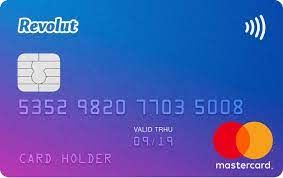
Revolut provides convenient international financial services with no minimum deposit for opening an account and zero monthly service fees for its Standard plan. When exchanging currencies, Revolut offers competitive rates with a tight spread between the buy and sell prices, based on market rates sourced from third-party providers on weekdays.
For the first £1,000 of currencies exchanged per month, there are no fees. However, any amount above this limit incurs a charge of 0.5% on the Plus plan and 1% on the Standard plan. On weekends, fixed exchange rates are applied with a markup, regardless of the account plan.
Revolut customers have access to cashback on accommodation, and those on the more expensive plans receive additional travel benefits such as airport lounge access and insurance for car hire, medical care, trip cancellation, delayed flights, lost luggage, and winter sports.
Revolut delivers similar or even superior banking features to those of traditional banks. You can easily track your spending categorised by transaction types, such as shopping or restaurants, and set monthly budgets and spending goals for different categories. Revolut cards also support direct debits in GBP and can be set up with Apple or Google Pay in selected countries.
Pros
- Daily interest of up to 4.75% AER on savings
- Up to 10% cashback on Stays and Experiences bookings
- Additional features such as trading and investment options
Cons
- The majority of travel perks come with higher-tier paid plans
- 2% ATM withdrawal fee if you withdraw more than £200 per month
- Exchange fair usage fee of 1% after exchanging £1,000 in a month
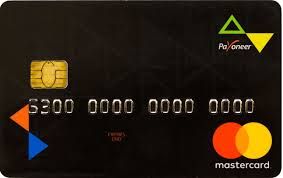
Payoneer is an internationally recognised online payment processor that caters to a range of clients, including freelancers, service providers, e-commerce sellers, and digital marketers.
Payoneer's local receiving accounts conveniently offer seven major currencies, namely, USD, GBP, EUR, CAD, AUD, JPY, and CNY. Its comprehensive dashboard tracks sales from multiple marketplaces and creates custom invoices, while also providing tools to pay vendors, contractors, VAT, and other taxes.
Clients can also download sales reports in PDF and Excel formats to manage their accounting needs. This makes it ideal for freelancers, agency owners and digital nomads who transact globally and need the flexibility to move funds effectively.
While currency transfers between Payoneer accounts are free and instant, you will be charged for making withdrawals and payments in foreign currencies.
Pros
- Fee-free transfers between Payoneer accounts
- Quick and easy money transfers
- Custom invoicing capability makes it suitable for freelancers who love to travel
Cons
- Relatively high card transaction fees
- $29.95 annual fee for inactive accounts
- £9.95 card replacement fee
How We Rate and Review the Best Bank Accounts for Travelling
To help you find the best bank accounts for travelling, we compared providers and curated the above list based on the following criteria:
Regulatory Compliance – This refers to the regulations set out by the government and financial institutions that banks must adhere to in order to operate. This is important as it ensures that customers are protected from fraud, money laundering, or other suspicious activities.
Account Features and Perks – There are several things we consider in this regard, including but not limited to foreign transaction fees, ATM access, account minimums, interest rates, and monthly maintenance fees. We also looked at travel-specific packaged account features such as airport lounge access and travel insurance.
Fees and Pricing – We not only looked at the cost of opening an account and maintaining it, but also any other potential expenses, such as foreign exchange fees, ATM withdrawal fees, overdraft charges, and more.
Customer Service and Support – It's best that banks provide 24/7 customer service via phone, email, or live chat so that customers can get help quickly if they have any questions or issues while abroad.
How Do Bank Accounts for Travelling Work?
For starters, there aren't any types of bank accounts that are specifically designed for travellers. But, there are some that offer a range of features and services that could be beneficial to those who travel often.
Features of Bank Accounts Used for Travelling
Now that we've talked about the best bank accounts you can choose from while travelling, here are the features they come with to make it on this list.
Overdrafts – Short-term loans that can help you manage your budget if funds run low, which can be helpful if an emergency arises whilst you are travelling.
International Payments – Many banks offer international payments, so if you need to send or receive money while you’re away, this can be done securely and quickly. This is especially useful when dealing with currency exchange rates, as travel bank accounts typically allow you to get better rates than usual.
Currency Conversion – You may want to convert your own currencies while travelling in order to maximise your budget. Bank accounts for travellers often come with built-in currency conversion tools that make it easy for you to do just that and save time and money.
ATM Access – When travelling abroad, having access to ATM networks is essential in order to withdraw cash. Bank accounts for travelling will usually allow access to a large network of ATMs, so you can easily withdraw money without worrying about conversion rates or fees.
Budgeting and Tracking Expenses – Being able to track your spending and budget is essential when travelling, as it helps you stick to your budget and avoid overspending. Some bank accounts offer tracking tools that can help you easily keep an eye on your finances while on the move. Or alternatively, you can explore dedicated budgeting apps.
Invoice Payments – Some banks also allow you to send invoices to your clients when travelling, which is a great way to keep up with business while abroad. This also makes it easier to settle up with customers or vendors quickly and securely.
How to Sign Up for a Bank Account for Travelling
Registering for the bank accounts listed above is very straightforward. We’ll use Revolut as an example to walk you through the steps.
Step 1: Download the Revolut app from the official Revolut website.
Step 2: Provide your phone number and create a four-digit passcode for your account.
Step 3: Provide the six-digit PIN you received via SMS.
Step 4: Provide your name, mailing address, email, and SSN or ITIN as per legal requirements to verify your identity.
Step 5: Carefully review and agree to the Cardholder Agreement, and your account is now active.
Common Charges Associated With Bank Accounts for Traveling
Here are some of the most common fees associated with bank accounts designed for travellers.
Description | Average | |
|---|---|---|
Currency Conversion Fees | These fees can vary depending on the currency pairs being converted and the amount. Most often, travelling bank account providers will impose a fixed fee, sometimes only imposed once a free allowance has been used up. | 3% per transaction |
Overdraft Fees | If you use an overdraft facility while travelling, your bank will charge interest on the amount you borrow. The interest rate can depend on the amount, the period it’s owed, and other factors. | 34% APR (variable) |
Card Delivery or Replacement | If you lose your card and need to have it replaced, there may be a delivery or replacement fee associated with having the new card sent abroad (if possible). | Between £5 and £30 |
ATM Withdrawal Fees | While ATMs around the world will charge a fee for cash withdrawals from other banks, there can be ATM withdrawal fees imposed by the bank issuing your card as well. | Between 1% and 3% |
Money Transfer Fees | Most banks will charge you a fee each time you transfer funds abroad. However, some issuers allow fee-free transfers between clients of the same provider. | Between 2% and 5% |
Payment Processing Fees | Some banks charge fees for POS card payments abroad, and even online payments to merchants based abroad. | Between 1% and 3% |
How to Choose the Best Bank Account for Travelling
Finding the best bank account for travelling can be tricky, as there are many factors to consider. You need to define what you want out of the account and how it fits in with your overall travelling needs. Here are five pointers to help you choose the best bank account for travelling.
Fees and Charges
The cost of using a bank account can quickly add up, particularly when travelling. Review the provider’s currency conversion, ATM withdrawal, and monthly service charges.
Many factors can affect the amounts of these fees, such as transaction amounts, the number and location of transactions, and more. Make sure to compare them against your needs while travelling to find the best fit for you.
Regulatory Compliance
Choosing a bank that’s compliant with local regulations is very important in general, not just when travelling. Make sure that the bank you’re considering offers a secure platform and meets all relevant compliance standards to ensure peace of mind while using it during travels.
Some of the regulatory agencies to look for include the Financial Conduct Authority (FCA) in the UK, and the European Central Bank (ECB), the US Federal Deposit Insurance Corporation (FDIC).
Debit Cards and ATMs
Debit cards are the most convenient way to access funds when travelling and make payments. Make sure that you check what type of debit card is offered by your bank, as some may only offer a physical card while others may also provide virtual cards for added convenience. You should also make sure you have access to ATMs in the countries you’re travelling to, so that you can withdraw cash if needed.
Security Features
Security is essential when using any kind of banking service while travelling, especially if your bank account will be accessible online or via an app. Make sure that all security features offered by your bank are up-to-date, such as two-factor authentication (2FA) and encrypted connections. Real-time tracking and spending notifications are also useful to keep on top of what's happening with your money.
Customer Service
When choosing a bank account for travelling, you want to make sure that you can access help easily should any problems arise while away, and that the response times are satisfactory. Look for banks that offer 24/7 customer support, whether by phone or email, as well as comprehensive help information on their website.
By keeping these key points in mind when selecting a bank account for travelling, you can be sure to find the best option for your needs. With the right set-up and preparation, you’ll have everything sorted before jetting off on your next trip!






.jpg)
.jpg)

